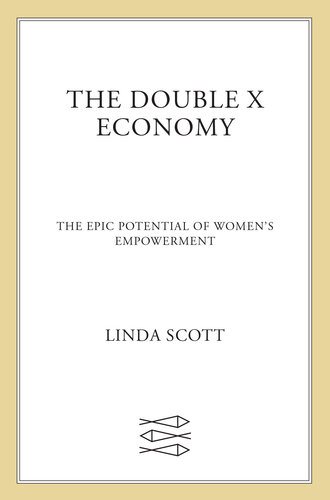
The Double X Economy
The Epic Potential of Women's Empowerment
- اطلاعات
- نقد و بررسی
- دیدگاه کاربران
نقد و بررسی

February 3, 2020
In this remarkably comprehensive debut, University of Oxford business professor emeritus Scott argues that “barriers to women’s economic inclusion” have created “a shadow economy unique to females” and that removing these obstacles will “put a stop to some of the world’s costliest evils, while building prosperity for everyone.” Among other barriers faced by women, Scott lists toxic environments at American universities and restrictions on freedom of movement for married women in Bangladesh. Citing statistics from the World Bank, she contends that child marriage costs the world an average of $4 trillion per year. Scott details how men dominate the agricultural industry in Africa, leaving women to “squeez income from a small plot close to home”; posits that flaws in maternity leave and childcare policies have contributed to population decline in the West; and recounts her own work in Ghana distributing sanitary pads to encourage girls to attend school rather than stay at home during menstruation. Closing with practical tips for making improvements on the global, national, and individual levels, Scott delivers a persuasive call to action enriched by hard data and personal experience. Feminists, economists, and policy makers should consider this impressive and impassioned account required reading.

February 15, 2020
The roles women play--and should play--in the world's economy. "Everywhere, the barriers to women's economic inclusion reach beyond work and salary to encompass property ownership, capital, credit, and markets," writes Scott, the founder of the Global Business Coalition for Women's Economic Empowerment. When these issues are combined with sexual harassment and violence, women find themselves disadvantaged at every level, which in turn creates an imbalance in the world's economies. In this in-depth, highly revealing analysis, the author dives headfirst into the multiple layers of hindrance that prohibit women from obtaining equal status with men. These issues can be simple, like the lack of feminine hygiene products for young girls in developing African nations. Without them, they are unable to attend school, which puts them behind their male counterparts, leading to a high dropout rate, and "once a community knew that a girl had menstruated, men would begin following her to and from school"--a trend that often leads to sexual violence. Furthermore, women own less than 20% of global land, so safety and security are often in men's hands. If women choose to become mothers, they often leave the workforce--or never enter it in the first place--in order to raise their children, which puts them in a dependent position. Throughout, Scott backs her arguments with hard data and numerous charts and graphs, showing unequivocally that women are not being treated fairly regarding nearly every aspect of the global economy. Fortunately, Scott shares plenty of easily implementable ideas to change the situation--e.g., using women's purchasing power to boycott companies that refuse to provide equal pay. The author's assessment of the current situation is bleak, but with her suggestions, the future could be brighter for everyone, not just women. A precise, eye-opening account that shows what needs to change to make the world a more equitable environment for all.
COPYRIGHT(2020) Kirkus Reviews, ALL RIGHTS RESERVED.

April 1, 2020
Gender equality has been a long-fought battle with lots of scholarship behind it. Scott (entrepreneurship and innovation, Oxford Univ.) adds to the mix with a deep dive into the historic economic exclusion of women and the problems--both for women and for the global economy--it has caused. Scott begins by laying out the basics of the Double X Economy concept, weaving in her own experiences that propelled her forward into this study. The bulk of the book examines the multiple impediments (work, salary inequity, lack of property ownership, capital credit, participation in global markets, and governance) and constraints (limited mobility, reproductive vulnerability, the ever-present threat of violence) that keep women from participating equally. Scott closes by offering insight and recommendations for engaging and benefiting from the Double X Economy, highlighting five priorities for the United States, three areas of focus for the world, and six areas of impact for individuals. Though the book is without question well-researched, larger and full-color illustrations would add to the impact and readability of the material. VERDICT Weighty subject matter with an edge. Will appeal to fans of social commentary and those interested in women's and global economic issues.--Sara Holder, Univ. of Illinois Libs., Champaign
Copyright 2020 Library Journal, LLC Used with permission.

April 15, 2020
In every country on Earth, women are systematically shut out from wielding economic power, whether through wage gaps, sexual violence, or the simple refusal to dedicate scholarly inquiry to women's issues. Researcher and activist Scott examines how male financial domination holds back economic growth, assembling a breathtaking array of data and case studies from settings as disparate as rural Ugandan schools and the board rooms of venture capitalists. Women who are given the means to pursue financial and personal independence consistently work to improve conditions not just for themselves, but for their families and communities. Yet corporations and governments continue to ignore the importance of women as workers and spenders, even when data overwhelmingly shows that investing in women yields robust returns. As the book's title signals, Scott sometimes falls into the trap of gender essentialism, and she gives little consideration to the impact of intersectional oppression, particularly in developed nations. Despite these flaws, The Double X Economy is a thorough, authoritative rebuke to the sexist exclusion of women from financial systems across the world.Women in Focus: The 19th in 2020(Reprinted with permission of Booklist, copyright 2020, American Library Association.)




دیدگاه کاربران